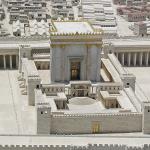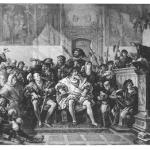A reader:
I’ve been reading through the Bible, and I came across this passage in Wisdom which really bugged me, and I was wondering if you could help me make sense of it? It’s from Wisdom 3:11-19:
For whoever despises wisdom and instruction is miserable. Their hope is vain, their labors are unprofitable, and their works are useless.
Their wives are foolish, and their children evil;
their offspring are accursed.
For blessed is the barren woman who is undefiled,
who has not entered into a sinful union;
she will have fruit when God examines souls…
But children of adulterers will not come to maturity, and the offspring of an unlawful union will perish.
Even if they live long they will be held of no account, and finally their old age will be without honor.
If they die young, they will have no hope and no consolation in the day of decision.
For the end of an unrighteous generation is grievous.
The part that’s really bothering me is that it seems to to be saying children of adultery are evil and cursed. Especially the last verse when it says the children will have no hope in the day of decision, which I assume means judgment day? Sounds like they’re being judged and damned for their parents sins…
I can understand temporal punishment and suffering the consequences of the sins of a parent, but it really sounds like eternal punishment here.
Am I misunderstanding it? I feel like I am, but I don’t know how else to read it. Any help you can give would be greatly appreciated.
Always bear in mind that when you are reading the OT you are reading incomplete revelation. The Old Testament itself makes this clear when for instance Jeremiah tells Israel that the day is coming when God will make a new covenant with Israel, not like the Mosaic covenant and the prophet tell Israel to await the coming of Messiah who will reveal things hidden from the foundation of the world. So the Old Covenant is always point forward to Christ and the New is always looking back to the Old.
One of the things that the Old Covenant writers are often struggling with is the mystery of original sin and what we might call “corporate personality”: the mysterious way in which the sins of the fathers afflict future progeny. On the one hand, sins of parents affect descendants (the sin of Adam being the supreme example). On the other hand, each is responsible for his own life (as an amazed Ezekiel will announce in Ezekiel 18 when he repudiates the idea that a son is somehow guilty of a particular actual sin simply because his father committed it, or vice versa).
The Christian revelation, of course, will emphasize both truths as well. All are sinners “in Adam”. But that does not mean the child bears guilt if his parents are adulterers. But the adultery will still hurt and affect the child in various ways. Among these are the fact that one’s social standing (through most of human history) will be injured by cultures who social and legal structures will regard him as “illegitimate” etc. It is this “day of decision” to which, in all likelihood, Wisdom is looking: the illegitimate child’s “day in court” in which he will likely lose whatever case he brings for inheritance. With this goes all kinds of other ills, of course, including the kind of anger and bitterness that goes with getting the short end of the stick in culture with zero social safety nets for disinherited children (Recall the fate of the disinherited Ishmael or Esau and the latter’s heartrending cry, “Bless me! Me also!” after Jacob stole his birthright.)
So I don’t think Wisdom has in mind the notion of eternal judgment here, but is instead thinking of earthly judgments that the children of adultery were, in general, likely to receive. Adultery will, of course, take on a spiritual dimension as well in the Old Testament: becoming a symbol of the relationship between faithless Israel and her cuckolded God. The “children” of such a relation were, in this reading, Israelites who themselves whored after other gods and follow the lead provided by her kings and priests in worshipping the Baals. There’s a reason Jezebel’s name has become a synonym for both a temptress and an idolator. Proverbs will flesh out this parallel by comparing the adulterous woman to tempter who leads the unwary away from God and wisdom and wise woman is Wisdom herself, the companion of God himself as he framed and built the universe. The Christian tradition will see in that “woman” (Sophia in Greek) is an image of the Spirit of Christ “the wisdom and power of God”. So the Christian tradition will see the relationship between Christ the Bridegroom and his Bride the Church in profoundly nuptial terms and apostasy as a kind of adultery (just as the prophets did).











